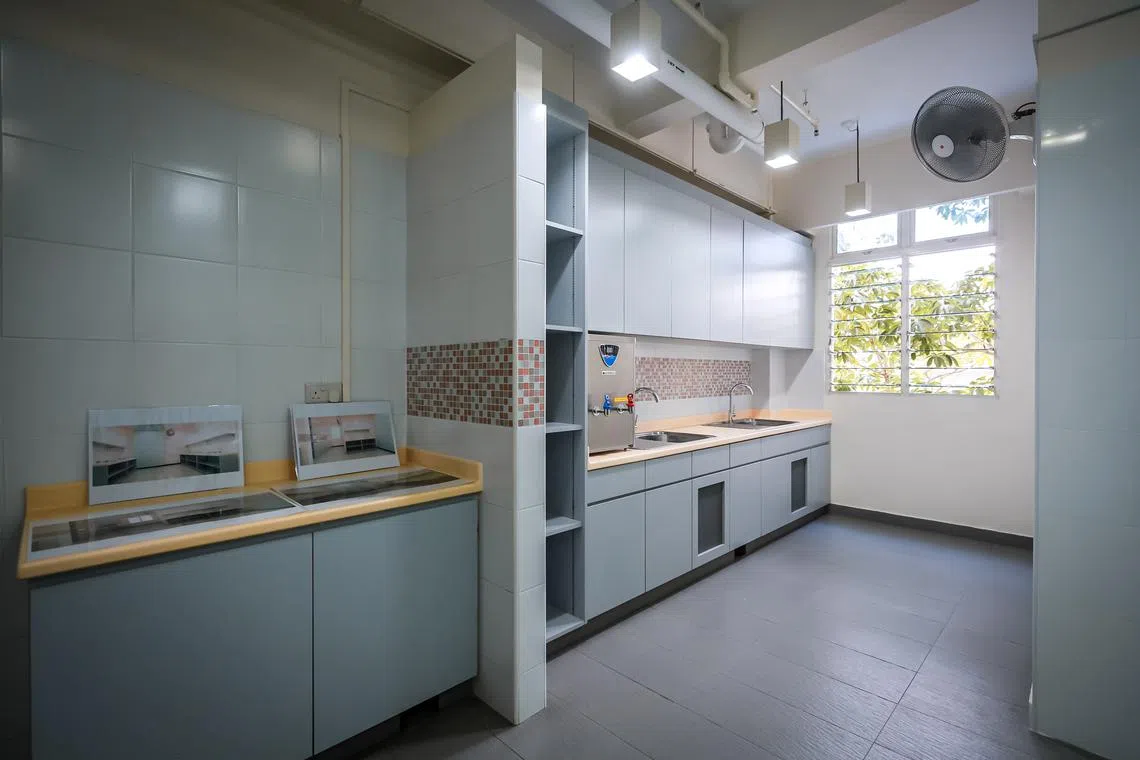HDB to pilot new type of public rental housing with own room, shared facilities for low-income singles
Sign up now: Get ST's newsletters delivered to your inbox
SINGAPORE - A new type of public rental housing where low-income singles live in their own rooms but share toilets and kitchens will be rolled out at the end of 2023.
Called Single Room Shared Facilities, this new housing type aims to give tenants greater privacy while providing a community-type living environment, the Housing Board said on Monday.
HDB will pilot the initiative at the former Anderson Junior College hostel in Ang Mo Kio Avenue 8, which comprises two 11-storey blocks.
The site can accommodate 480 tenants in single rooms, fully partitioned from 240 units.
Each room, of about 9 sq m, will come fitted with basic furnishings such as a single-size bed frame, wardrobe, table, chair, wall shelves and a mini refrigerator.
Tenants will have to buy their own mattress for hygiene reasons, said HDB.
The 24 tenants on each level will share common facilities such as a kitchen equipped with five cooking stoves, sinks and cabinets. There will be two common bathrooms on each level, which means about 12 people will share three shower cubicles and three to four toilets.
They will also share laundry and activity rooms in the compound, as well as dining areas repurposed from former study rooms.
This set-up is unlike the Joint Singles Scheme Operator-Run model implemented in end-2021, which pairs singles to share a one- or two-room HDB flat that has been semi-partitioned.
Speaking to reporters after a tour of a sample unit, National Development Minister Desmond Lee said the former hostel site was picked to reduce the preparation time to start the pilot, as HDB could “make do with the existing infrastructure and make adjustments to it”.
Mr Lee said the other option was to build a new facility, but this would take some years and a lot of resources just to pilot a new model, compared with retrofitting an existing site.
“If we do make this a permanent feature of our rental flat offerings, there will of course be changes to the configurations and the ratio (of tenants to facilities). This is using existing infrastructure and making do with what we have to test out this model,” he added.
Mr Lee said the pilot would run for one to two years for HDB to collect data on whether the model works, and if it should be included as a permanent solution among the Government’s public rental schemes involving both newly built rental flats and retrofitting existing or older rental flats.
“Certainly, there will be lots of things to learn from this pilot. It may not work out, or it may work out provided we make some adjustments to the space, configurations and ratio. The key thing is giving it a go and learning along the way,” he said.

A kitchen, to be shared among 24 tenants living on the same level, will come with basic appliances such as cooking stoves.
ST PHOTO: GAVIN FOO
The former hostel site is currently being fitted out, and singles will be able to apply individually at end-2023 when it is ready.
Applicants must be Singaporeans who are single, divorced or legally separated, and at least 35 years old. Those who are widowed or orphaned and at least 21 years old can also apply.
Each tenant will pay a fixed fee every month comprising the individual rent – varying according to the person’s monthly income and other factors – utilities and conservancy charges.
HDB said more information on the rent will be released later in the year.
An operator will be appointed to manage the site, including dealing with tenancy matters and providing social support, as well as furnishing and maintaining the premises, said HDB.
Low-income singles will also have the option to apply to three new sites under the Joint Singles Scheme Operator-Run model. Applications for the three new sites in Bukit Panjang, Bidadari and Sengkang, which can accommodate 600 tenants in total, will open at the end of 2023.
Institute of Policy Studies research fellow Harry Tan, who was among those consulted before HDB launched the latest scheme, said some tenants gave feedback that they wanted to live on their own and have their own private space.
“The chief reasons we hear on the ground are negative experiences and conflicts they have with co-tenants over living habits, or people who have certain experiences or trauma that make them think twice about living with other people,” said Dr Tan.
Having an operator such as a social service agency to offer “wraparound services” is key to mediating and resolving any possible conflicts, he added.
“These services include catering to social, emotional and material needs, which, for needy individuals, are very important – even as simple a thing as the provision of a fan. (They think), if I want certain things, do I have access to these services? Do I have access to people I can call?” said Dr Tan.
In designing the new model, the Ministry of National Development (MND) and HDB in 2022 engaged stakeholders including social work professionals, social service agencies, academics and researchers.
Most were supportive of providing this additional option, which offers more privacy and addresses some of the challenges with the Joint Singles Scheme, said MND.
Other suggestions were for design features and amenities to better meet the needs of tenants of different ages, races and religious groups, and the kinds of social interventions that may be needed to support residents and prevent them from becoming isolated.
“We have taken in their feedback where possible and will continue to learn and refine the model,” said MND.



